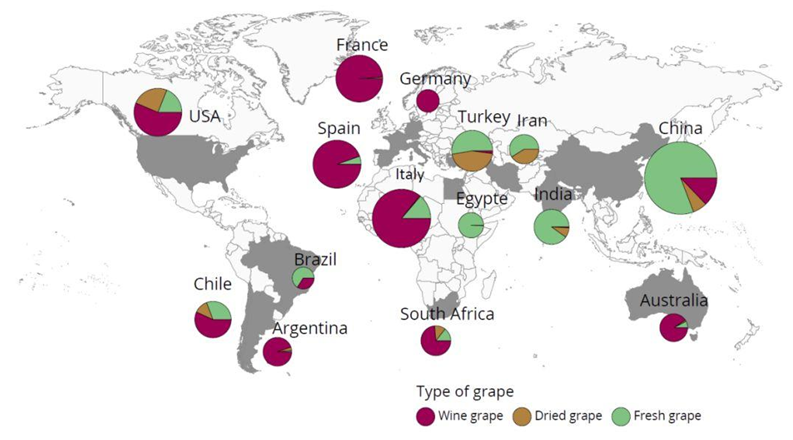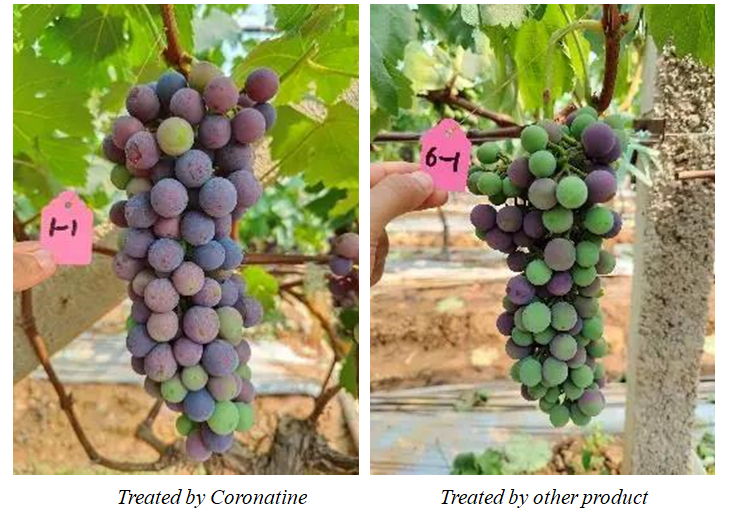Coronatine 0.006% AS improves coloring, increases sugar content of grapes share
Release time:2023-08-22 14:50:57 Visits:
Grapes, including table grapes, wine grapes and raisins, is one of the most important crops in the world. According to statistics from the International Organization of Grapes and Wine (OIV), in 2016, the global grape planting area was 7.5 million hectares, with an annual output of 77.3 million tons of grapes, a decrease of about 4% compared to 2000. The major grape producing countries include Spain, China, France, Italy, Turkey, and the United States.

Fig.1: Major grape growing countries in the world
Anthocyanin is a phenolic compound, water-soluble pigment, and one of the main pigments that make up the color of petals and fruits. The anthocyanins in grapes are mainly found in grape skins and can be converted from chlorophyll. In autumn, when the soluble sugar in grapes increases, and the anthocyanins gradually turn red or purple. At the same time, anthocyanins are also an important indicator for judging grape wine quality. Therefore, anthocyanin content is very important for both table grapes and wine grapes.
After more than ten years of painstaking research, the Biotechnology Research Institute of Chengdu Newsun Crop Science Co., Ltd. and the Engineering Research Center for Plant Growth Regulators of the Ministry of Education of China Agricultural University have fully cooperated in jointly developing Coronatine.
It is reported that by inducing plant gene expression, Coronatine activates the biosynthetic pathways of anthocyanins to increase the accumulation of high-level anthocyanins in grape peel and pulp. At the same time, Coronatine increases the photosynthetic rate of crops and increases the accumulation of internal proteins, amino acids, sugars and other substances in plants, thereby, improving crop quality and yield. Coronatine can be widely used on crops to change color, increase sugar content and flavor substances, and improve the quality of agricultural products.
The following is a field comparison between Coronatine and other products for improving the color of grapes:1) Location: Yunnan Province, China2) Grape variety: Xiahei3) Treatment time and method: March 20, 2021, by foliar spray
On March 24, 2021 (four days after treatment), the grapes treated with Coronatine showed obvious color change, as shown in photos below:

On March 28, 2021 (eight days after the treatment), the color of the grapes treated with Coronatine deepen and even out in color, while the fruit powder on the grape skin is thick.The photos are below:

On March 30, 2021, after treatment with Coronatine for ten days, the color is darker and more uniform than the control, and the fruit is more flavorful, as shown in the photos below:


Coronatine (COR) is a new type of plant growth regulator and the world's first industrial jasmonic acid molecular signal regulator. Coronatine signaling molecules are involved in the regulation of many physiological processes in plant growth and development. It also has broad application prospects during low temperature seed germination, as well as crop adversity resistance, disease resistance and yield growth enhancement properties. It can also be used for improving color, increasing sugar content, preventing defoliation, and with biological herbicides.
Chengdu Newsun Crop Science Co., Ltd. and the Engineering Research Center for Plant Growth Regulators of the Ministry of Education of China Agricultural University have fully cooperated in jointly developing Coronatine. In December 2020, Coronatine 98% TC and Coronatine 0.006% AS submitted by Chengdu Newsun Crop Science Co., Ltd. were approved by the Ministry of Agriculture in China, meaning that Coronatine is about to be registered. Coronatine will soon be on the market, so stay tuned!

 中文
中文 EN
EN

